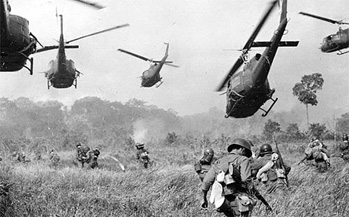TV Recap - The Vietnam War: Episode 1, Part 1
Episode 1
By Mark Light
September 21, 2017
We return to the year 1919 and the Paris conference to draw up the Versailles Peace Treaty ending World War I. Woodrow Wilson was there to lead the American delegation. Wilson had declared that the interest of colonial peoples should be given equal weight with their European colonial rulers. One of the first great “What-If” moments of the film is brought out. A 29-year-old man with the alias of Nguyen Xi Quac presented a petition to the Americans on behalf of the rights of the Vietnamese. Though a secretary promised to give it to the president, there is no evidence that Wilson ever saw it. Nor do we know what Wilson, a confirmed racist, would have actually done if he did see it. But it is significant in that Nguyen Xi Quac would assume several more aliases before finally settling on his last alias, Ho Chi Minh. And this would not be the last attempt of Ho Chi Minh to appeal to the Americans to try to see things his way.
We are given a brief biography of Ho Chi Minh up to the year 1941. He was a socialist who became a communist when discovering the anti-colonial writings of Lenin. He went to the Soviet Union for training and was sometimes criticized for being a Vietnamese nationalist first, and a communist second.
As WWII engulfed Europe, Japan began picking off European colonies in Asia. They invaded Vietnam and rather than present a counter to the French, they left the Vichy French in place. The collaborationist French ran the country for the Japanese, who reaped the country's resources. The rice production of Vietnam was shipped in large part to the Japanese, while some Vietnamese starved. Some had hoped the Japanese would be liberators, but it turned out that they were new oppressors. Thoughts turned to independence.
After 30 years in exile. Ho Chi Minh returned to Vietnam in 1941. He formed the Vietnam Independence League, the Viet Minh. To build its military arm, he turned to Võ Nguyên Giáp. Giap started developing his own theory of guerrilla warfare where a smaller, weaker force can ultimately prevail against a larger stronger force. The theory utilized maxims like: "Don't fight unless you are sure you can win" and "Choose your own battle." To drive this home, the film jumps to 1966 where Mike Heaney, a US Army veteran, recounts an effective ambush of his men by the Viet Cong.
Returning to the spring of 1945, we find the American government looking for allies behind the lines in Vietnam to undermine the Japanese forces there. Ho Chi Minh contacted them, and an OSS team was dropped in to meet with the Viet Minh leadership. The OSS started supplying the Viet Minh with weapons and Ho started calling his followers the Viet American Army. The Americans considered liberators by the Viet Minh at that point. They had been former colonial subjects themselves who had liberated Europe already. Surely they would liberate Vietnam from the Japanese and the French. Well, one out of two ain't all bad.
By 1945, hundreds of thousands of Vietnamese were starving in the north of the country while Japanese warehouses sat full of rice. Ho Chi Minh directed the Viet Minh to break into the warehouses wherever they could and distribute the rice. Of course, this greatly increased the popularity of the Viet Minh with the civilians.
Continued:
1
2
3
4




